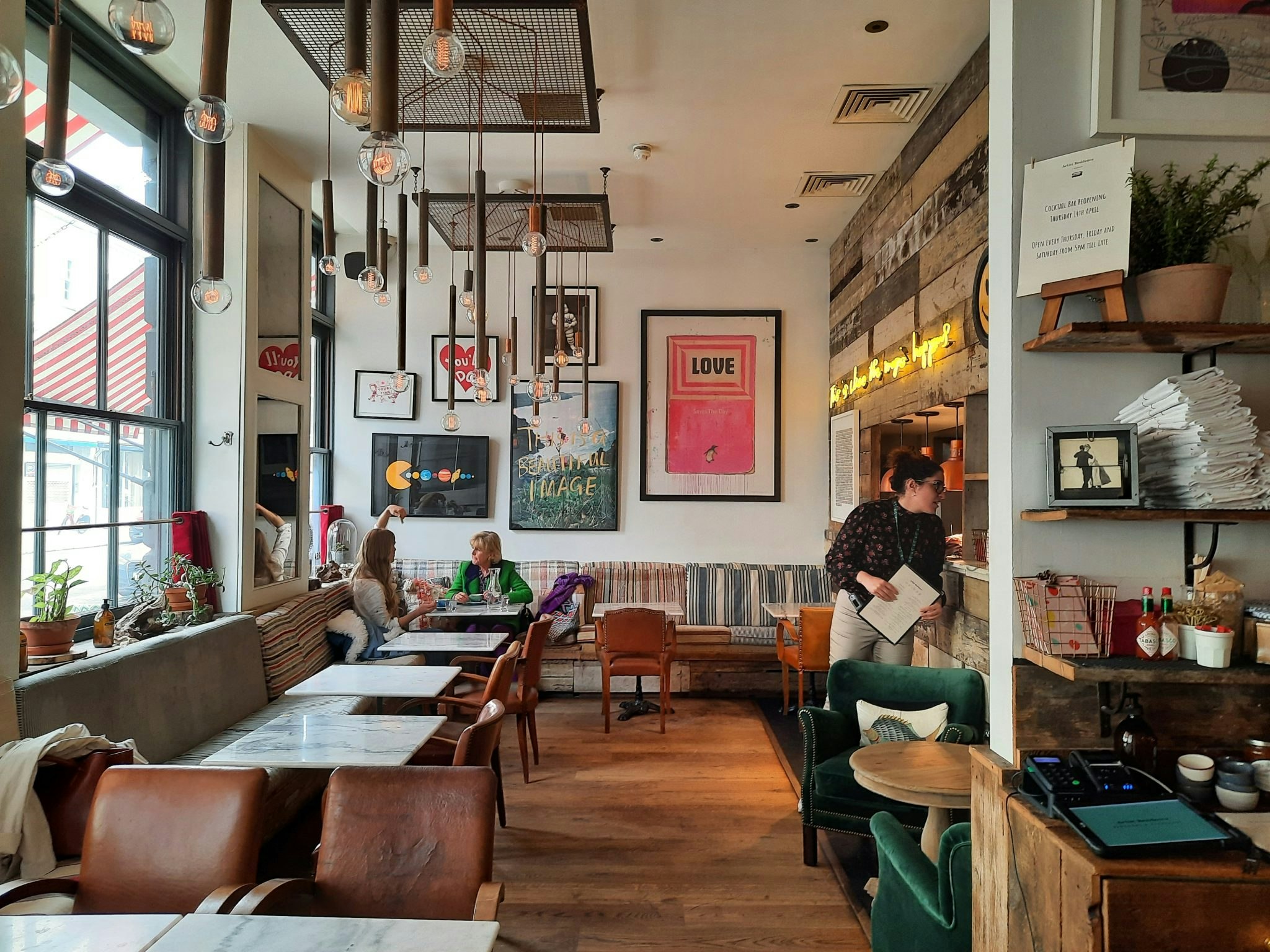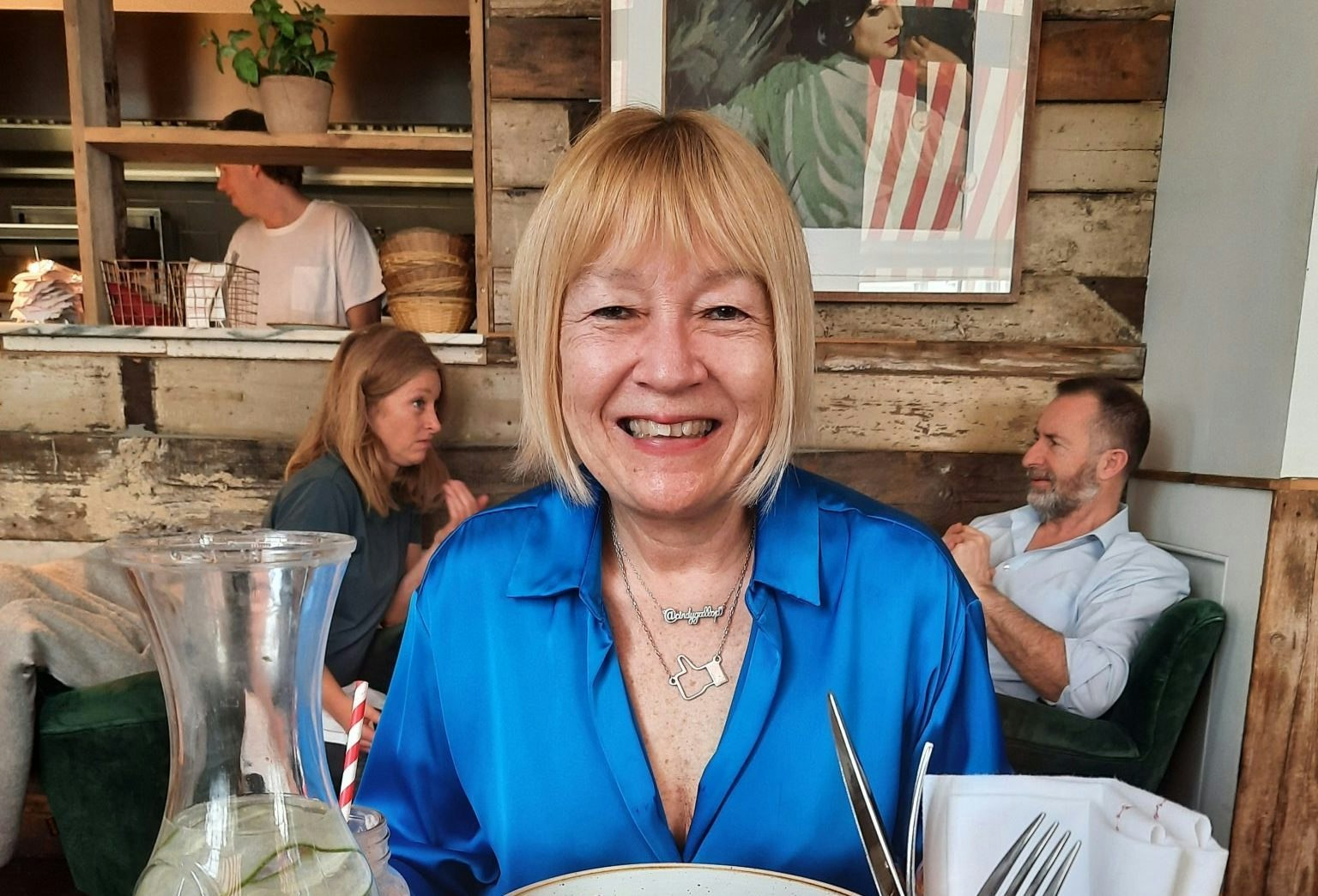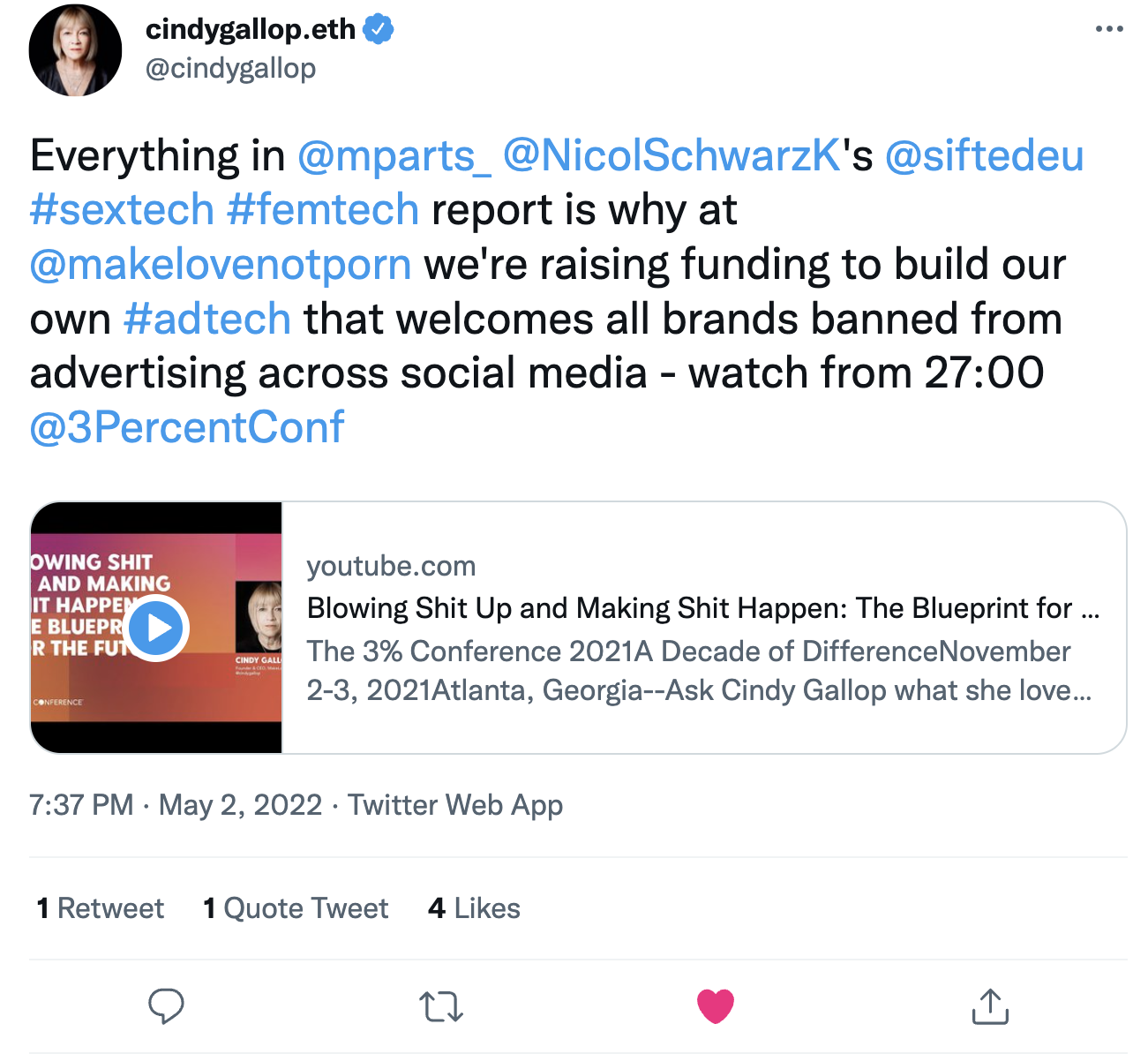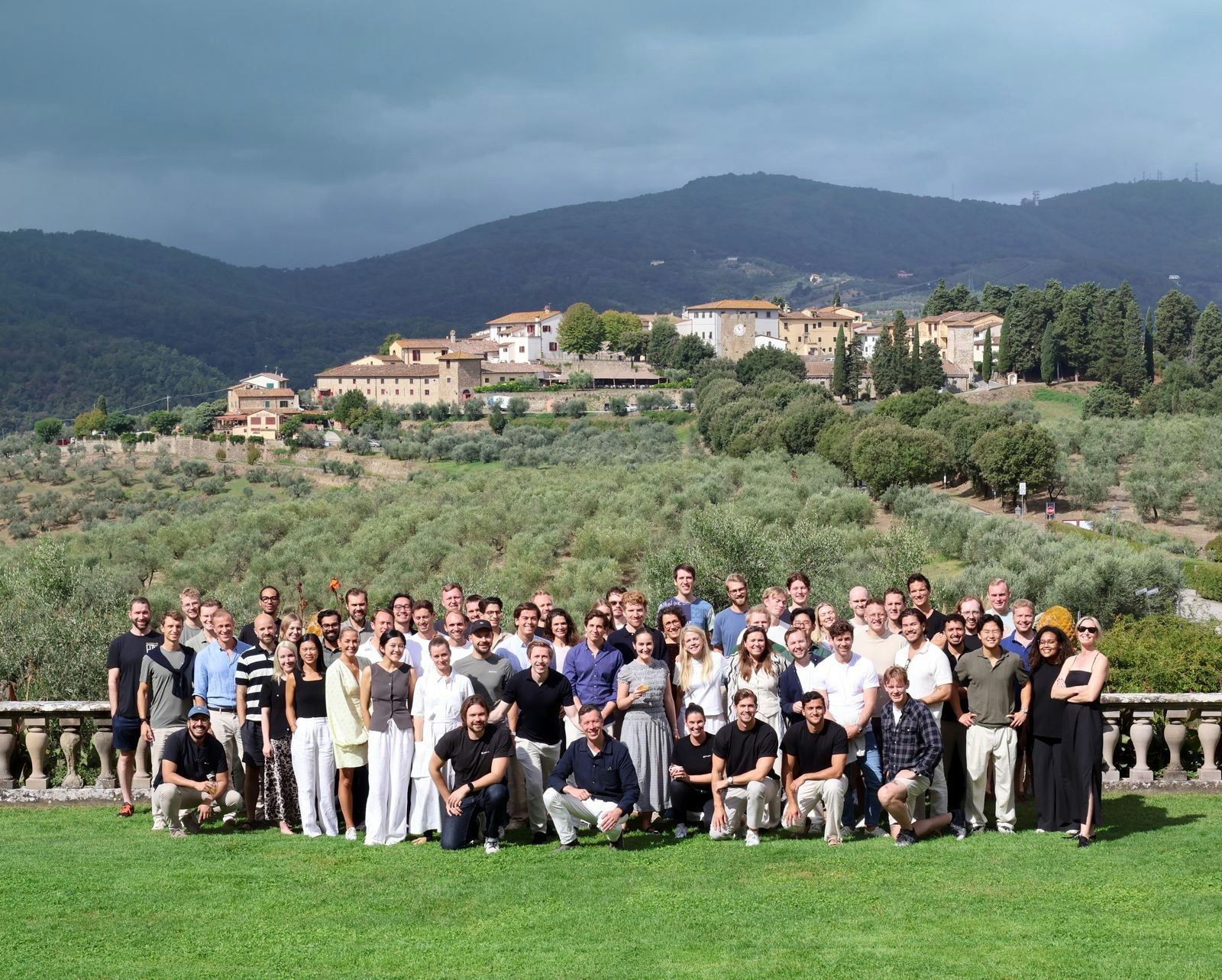When Cindy Gallop said the words “come on my face” in a TED Talk about the dangers of online porn in 2009, the internet erupted.
It was the first time anyone had said those words, in that order, on the TED stage before — and people were startled, amused, and a little bit impressed with her honesty.
The former advertising executive has built a reputation for talking openly — some say outrageously — about a topic that our prudish society would rather not discuss: sex.
She’s built a business out of it too. Gallop is the founder and CEO of MakeLoveNotPorn, a so-called social sex site where members can rent videos of real people having real world sex on a subscription basis.
The aim, explains Gallop over brunch in her favourite London hangout, the Artist Residence in upmarket Pimlico, is to show what realistic sex looks like “as it happens, in all its funny, messy, glorious, loving, beautiful, comical, hilarious humanness”. And to normalise talking about sex in the public domain, in education and, more crucially, in people’s intimate relationships.

These are lofty goals, and she's met numerous challenges. While the sextech industry is worth approximately $35bn globally, founders, particularly female ones, struggle to get funding. MakeLoveNotPorn itself has raised just $3m since its founding in 2009, as most investors suffer with a malady Gallop calls “the fear of what other people think".
While it’s taking all of her energy to knock down these barriers, Gallop is determined to be victorious: “13 years ago, when I founded MakeLoveNotPorn, I said I wanted to change the world through sex and make a huge amount of money doing it. And that’s still in my pitch deck now.”
The genesis of MakeLoveNotPorn
Despite being painfully jetlagged from a flight from her usual base of New York the day before, she arrives at brunch looking glamorous. Her diamond blue satin blouse, high-waisted shorts and knee-high leather boots are a perfect complement to our suave surroundings. My baggy jumper and battered white trainers are, in comparison, not.
Sipping on triple-berry smoothies, we get straight to the heart of the subject: Why are all of us so fucked up about sex?
The general view is that staged Hollywood-style pornography — which gives young people a skewed idea of what bodies look like and how sex is performed — is to blame. But porn, says Gallop, is not the issue.
If the only cues you have ever seen are in porn, those are the cues you are going to take to not very good effect
“The issue is that we don’t talk about sex. If the only cues for sexual behaviour you have ever seen are in porn — because your parents or school teachers never talked about it, and your friends aren’t honest about it — those are the cues you are going to take to not very good effect.”
Gallop has witnessed some of these undesirable, if not damaging, effects on young people herself. Twenty years ago, when online dating was “not yet a thing”, Gallop was asked to trial a dating app as part of the market research for an advertising campaign she was working on. She happily obliged.
“Much to my surprise, I got a lot of responses from much younger men. And I realised I was every young guy’s fantasy: a woman with a high-flying career, who never wanted to settle down and have children.”
What she discovered through these relations, however, was a number of bedroom behaviours where she thought, “Whoa, I know where that’s coming from. And if I’m experiencing this, then other people must [too].”
This discovery formed the basis of MakeLoveNotPorn. Gallop decided that, in order to counter the global impact of porn as “default sex ed[ucation]”, she would have to create something “just as mass, just as mainstream, and just as all pervasive in our society as porn currently is”.
Her aim now, Gallop tells me, is to make sex just as socially acceptable to talk about — and just as “socially shareable” — as “anything else you might find and share on Facebook, Tumblr or Instagram”.
The social sex site
Gallop insists that MakeLoveNotPorn is not porn, it’s not amateur, but it’s a new category altogether. As she puts it, using the best of her advertising training, “if porn is the Hollywood blockbuster movie, then MakeLoveNotPorn is the real-world documentary.”
Anyone can submit videos of themselves having sex to MakeLoveNotPorn and get paid for it — but only if the video gets accepted. Unlike platforms like Facebook, Snapchat and Youtube, says Gallop, the MakeLoveNotPorn team watches “every frame of every single video of somebody from beginning to end” before they approve and publish it. They do the same for every post on each member’s profile and every comment on each video to ensure offensive or potentially triggering comments never see the light of day.
This level of “curation” is unusual for tech platforms, adds Gallop: “The young white male founders of the giant tech platforms that dominate our lives today are not the primary targets of online/offline harassment, abuse, sexual assault, rape and violence. Therefore, they do not proactively design for the prevention of any of those things on their platforms.”
MakeLoveNotPorn, however, is designed to keep its community, especially women, people of colour, LGBTQ+ and disabled people, safe.
“We’re a tiny team [of six], we’re bootstrapping and we have no money, yet we’ve been curating everything for 10 years,” says Gallop. “If we can do this, think what Facebook could do with its billions.”
Business obstacles
That MakeLoveNotPorn has the power to “change people’s sexual attitudes and behaviour for the better” is why it is “criminal” — and Gallop uses that term “quite deliberately” — that MakeLoveNotPorn struggles to raise funding, and why the company faces so many business obstacles.
But before she gets started on this subject, which is clearly going to be a big one, we gesture to the waiter to take our order. I go for the superfood salad while Gallop orders the kedgeree — a hearty British dish of rice, flaked haddock and boiled eggs.
“And we must have the sweet potato fries as they’re divine,” she says.
Back on the subject of “bullshit” business challenges, Gallop explains her difficulties getting payment processors to work with her. PayPal and Stripe won't work with anything related to adult content, which means she has to “work with adult-friendly payment processes of which there is an entire murky subculture”.

And because “anybody adult has nowhere else to go”, she says, the rates from these payment providers are “extortionate”. MakeLoveNotPorn pays 12% of its revenue every month in processing fees compared with the mainstream rate of 3% or under. “That is a massive business growth inhibitor,” she says.
MakeLoveNotPorn has also been turned down by video hosting sites, email marketing platform Mailchimp and even freelance job platforms. Gallop remembers putting a standard UX designer description on Upwork a few years ago, which was taken down as adult sites are not allowed to advertise on the platform.
“In other words, what the fuck?” says Gallop.
It doesn’t help that any “female-lens” sexual health and wellness venture can’t advertise on Facebook or Google — making it even more impressive that MakeLoveNotPorn has grown organically to the size it is today. In the last 10 years, says Gallop, over a million people globally have signed up to the platform.
The best of sextech
With so many problems to solve in the way people speak about and experience sex, I ask Gallop what she thinks are the most impressive sextech ventures on the market today.
She immediately mentions Bump’n, previously called Handi, which has developed a hands-free sex toy to help people with disabilities masturbate.
And the reason she likes it? “When you make the world more accessible for disabled people, you make it more accessible for all of us,” says Gallop, who is a board member at Bump’n. “The first time I heard about it I thought, ‘Oh my god, my hand gets tired too!' Fucking genius.”
Other examples include Kama, a London-based app offering mindful sex practices to help people better experience intimacy and pleasure which has raised $3m; and Ferly, an audio app for mindful sex that has secured £1.5m in seed funding from Ada Ventures and others.
The injustice, says Gallop, is that many female-focused sextech ventures have raised “paltry sums”, compared to male-lens health ventures. She gives the example of Roman, a US-based company offering solutions for issues like erectile dysfunction, premature ejaculation and herpes, which is valued at $5bn.
“All female entrepreneurs have started their businesses because they solve big problems,” says Gallop. “We all are unicorns in waiting, and VCs and investors are doing themselves a disservice by not calling us.”
The opportunities in sex
Gallop sees business opportunities in industries where sex wouldn’t usually be considered a use case.
Take the automotive industry, for instance. People have sex in cars, says Gallop — especially in places around the world where, for socio-cultural reasons, premartial sex is forbidden, or where young people live at home with their parents until they’re married. Yet, the automotive industry is “spectacularly failing to factor this into product design and marketing”.
“Even more fundamentally, people have sex in bed, but the mattress industry focuses all its R&D on sleep,” adds Gallop. “There is a far broader business application of all of this than just the pure sexual products. And brands are leaving money on the table."
Asked which other industries are ignoring sex to their detriment, to which Gallop replies: “Every single one of them. And honestly, the biggest one is education.”
Raising big bucks
Gallop has conjured up a number of related ventures to MakeLoveNotPorn that have been stuck in the pipeline for years — because, you guessed it, she “can’t get them funded”.
But this hasn’t dissuaded her from actively seeking investment. At the moment, Gallop is speaking to a select few investors — some of whom actually approached her — to raise $20m for four things.
First, Gallop wants to optimise the MakeLoveNotPorn platform and build out its features, and says she’s hired the female “CTO of her dreams” to do that (though she can’t name names just yet).
Second, she wants to build the MakeLoveNotPorn academy, the Khan Academy of sex education for under-18s. Her team will aggregate resources submitted by sex educators from around the world and “promote the shit out of them” to make it easier for parents and schools to teach sex ed to their kids.
Then there’s the messaging app dedicated to safe sexting called CoSensual. The app will be “utterly secure” and block anyone from downloading and leaking any sexy messages, photos and videos shared between users — to encourage open, yet consensual, communication around sex.
She’s also building her own adtech where companies that are usually blocked from advertising their products — such as menstruation, menopause and fertility startups — can advertise as boldly and creatively as they want; no censorship.

Gallop’s pitches are, as would be expected, sparkling — but glancing at my watch, I see that time has run away from us. After chatting for over two hours, the sweet potato fries are long gone and Gallop’s nearly full plate of kedgeree has gone cold.
To conclude Gallop’s tour de force in sex, education and dismantling the hegemony of white male tech bros, she says: “So this is my vision of a world in which MakeLoveNotPorn gets funded to achieve our social mission at scale. And, as far as I’m concerned, four ventures for $20m is a bargain.”



